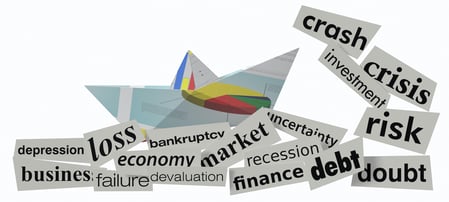How Does Stock Market Volatility Impact Your Financial Advisor Marketing Strategies?
No one has to tell you there’s plenty of bad news out there: Inflation, a potential recession, supply chain disruptions, Russia-Ukraine, Covid, unemployment, shootings, and illegal immigrants. Add it all up, and you have a formula for what the securities markets hate the most – uncertain times that make accurate predictions of company earnings more difficult.
People who have been investing in the securities market for any length of time already know market volatility is a reflection of our economic times, and it is normal when company earnings are disrupted. Knowledgeable investors should also know, after periods of losses, that the markets have always recovered and achieved new historical highs.
However, this knowledge may not change the emotions that drive the financial decisions of some investors. Left on their own, they tend to make emotional decisions that work to their detriment by undermining the achievement of their financial goals over more extended periods. An illustration of this phenomenon occurs when they buy when prices are high and sell when prices are low.
The topics included in this article cover:
- How market volatility impacts the priorities of financial advisors
- How advisors provide perspective during volatile market conditions
- Types of investors more inclined to hire advisors during volatile markets
- Why trust is more critical during volatile markets
- Why high-quality financial planning is a high priority in volatile markets
How does market volatility impact the priorities of financial advisors?

Client retention becomes more important and more time-consuming. A steady flow of high-quality communications (emails, blog articles, eBooks, videos) can be difference makers.
This is necessary because a percentage of every financial advisor’s clientele will let their emotions drive their decision-making. Consequently, the best content educates and informs with the goal of minimizing the impact of client emotions that cause them to make bad financial decisions.
How can financial advisors provide perspective during volatile market conditions?
Financial advisors bring valuable perspectives to the table because they understand investors' needs. That is, they are trusted advisors who will prepare their clients for real-life events (like now) and guide them through various market conditions.
It would be unrealistic to assume the markets always produce positive rates of return. So volatility is normal, but the reasons for the volatility will vary. Relationships work better in down markets when investors acknowledge this perspective by understanding what is happening and why.
Which investors are more inclined to hire financial advisors during volatile markets?
One type of investor is unhappy with the quality of the advice they receive from their current advisors. For example, the advisors created high expectations when they sold their services to investors, and now they are having trouble meeting those expectations. Therefore, some of their clients no longer trust the advice they receive from these advisors.
Another marketing opportunity is the Do-It-Yourself (DIY) investors who are comfortable managing their own money in bull markets but want the help of professionals in bear markets. Perhaps it’s not as easy as they thought it was.
Why is trust more important during volatile markets?
Any experienced investor knows that volatility is a constant in the financial markets. But with the right advice, clients and their advisors can work through turbulence without having to divert too much time or attention away from other projects or goals. Financial planning isn’t a one-time task: it’s an ongoing process of maintaining goals and objectives, as well as adjusting plans based on external factors that could have a negative impact on clients’ finances or the achievement of future goals.

Now is the time to emphasize a fiduciary relationship with clients (when applicable). This aligns the advisors’ fiduciary duties with their client's financial interests. This also facilitates working together to achieve the goals of investors.
Market volatility will never go away—this is something that every investor knows.
Nevertheless, it doesn't mean investors must be exposed to some of its hazards. Proper investment advice protects investors from the damage that volatility could do to their money and their peace of mind. The foundation of a good financial planning service should include top-notch investment advice.
Why is a high-quality financial plan more important in volatile markets?
The plan is the roadmap that investors follow to achieve their financial goals. There will always be bumps on the road to financial security.
High-quality plans assume there will be some volatility along the way. It would be very naive to assume the path to success is a straight road.
Investors’ biggest risk is not achieving their financial goals—for example, a secure, comfortable retirement for the rest of their lives. A volatile stock could be viewed as a “temporary” cost for achieving their goals.
Financial advisors and investors are no strangers to stock market volatility. However, with the right advice and tools, the impact of market declines can be measured against a more stable variable — a well-thought-out financial plan. The ability to sail through economic storms becomes almost as important as weathering the storms themselves.
If a plan is built on a solid foundation, it’s relatively easy to tweak it not only in extreme times but at any time and for any occasion. After all, financial plans don’t have to be cast in stone; instead, they should be flexible enough for investors and their advisors to adjust strategies and timelines.
Conclusions
Markets go up, and they go down. In general, they are reacting to economic events that impact public companies' earnings. Advisors know this, and so should their clients. But, a little extra hand-holding is definitely in order during volatile markets; if nothing else, the hand-holding reminds investors that their financial advisors have their backs.
Volatile markets are also an opportunity to add new clients that otherwise may not be seeking new advisors to replace current advisors who are not meeting expectations. Or, they have been managing assets themselves and are no longer comfortable with that responsibility.

